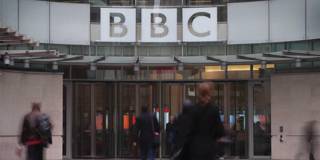Understanding the BBC’s contributions to the British economy and society – and the concept of public value more broadly – requires a new conceptual framework. Rather than viewing public institutions' role as being limited to fixing market failures, organizational structures like the BBC are also market shapers.
LONDON – In last year’s Reith Lectures – the BBC’s annual radio series – former Bank of England Governor Mark Carney observes that, since the 2008 financial crisis, norms and institutions have increasingly been defined by their monetary value. What is often missing from this discussion of price being confused with value, is how to capture the real worth of the public institutions that enrich us.
It is fitting that Carney makes this point on a BBC program. After all, the BBC was the first public broadcaster to incorporate the notion of “public value” into its governance framework. The British Broadcasting Corporation has become, alongside the National Health Service and The Open University, one of the United Kingdom’s most beloved, globally renowned institutions, reaching an audience of around 460 million each week.
Yet a vocal minority (often led by Rupert Murdoch-owned publications) wants to see the broadcaster destroyed. They decry the BBC’s commitment to inclusion and diversity as political correctness and they accuse it of “crowding out” private media companies, owing to the scale and scope of its services. In their view it is up to the private sector to create value; the state should focus only on filling the missing gaps and fixing what economists call “market failures.”

LONDON – In last year’s Reith Lectures – the BBC’s annual radio series – former Bank of England Governor Mark Carney observes that, since the 2008 financial crisis, norms and institutions have increasingly been defined by their monetary value. What is often missing from this discussion of price being confused with value, is how to capture the real worth of the public institutions that enrich us.
It is fitting that Carney makes this point on a BBC program. After all, the BBC was the first public broadcaster to incorporate the notion of “public value” into its governance framework. The British Broadcasting Corporation has become, alongside the National Health Service and The Open University, one of the United Kingdom’s most beloved, globally renowned institutions, reaching an audience of around 460 million each week.
Yet a vocal minority (often led by Rupert Murdoch-owned publications) wants to see the broadcaster destroyed. They decry the BBC’s commitment to inclusion and diversity as political correctness and they accuse it of “crowding out” private media companies, owing to the scale and scope of its services. In their view it is up to the private sector to create value; the state should focus only on filling the missing gaps and fixing what economists call “market failures.”